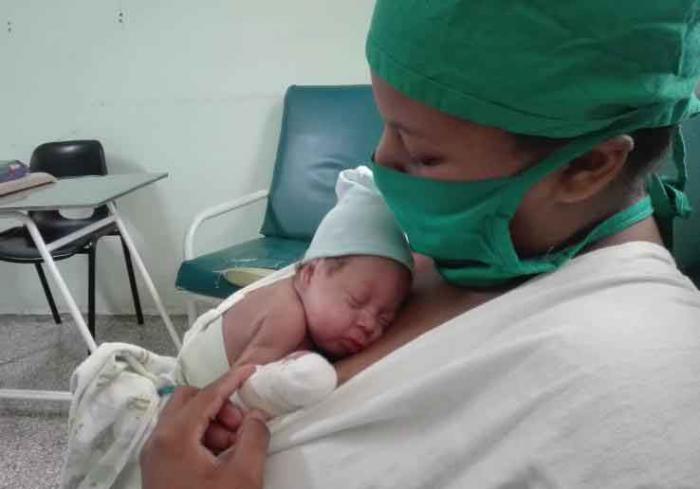
Playa Municipality has had a child fatality rate of zero during this year
The child fatality rate in the municipality of Playa is 0. This is the result of the actions done to ensure that every pregnancy has a happy ending, and it shows the efforts Cuba makes to continue having similar indicators to those in the first world.
Since last year, the territory created a definitive strategy within its Mother-Child Assistance Program (PAMI). The vice-director of medical assistance in this locality’s Municipal Health Direction is Lucy Mary Pérez Santana, mentioned to Tribuna de La Habana that there were 390 births until the end of May, and that they have not had any deaths in children below the age of one. An improvement respecting the three deaths that were counted by the same time last year.
“That favorable outcome of the program has as a basis the specific attention to the expectant mothers. Let us remember that after their registration, they attended evaluation visits and some others depending on the amount of weeks. We went beyond the procedures, focusing in those that had a major risk factor, who must be visited every fifteen days by the specialist”.
“This way, we managed to reinforce the attention given by the family doctor, in order to detect any complication as soon as possible, as the pregnancy time advances. This was decisive because we were able to evaluate a lot of risk factors that usually go unnoticed, but which can be adequately controlled if monitored selectively.”
Some of the risk factors were: blood pressure, cervix-vaginal infections, and also those of the urinary tract, which usually produce a higher fatality rate if they are not adequately monitored. This could be during labor or as a post-labor consequence.
“We do not omit anything of the indicated procedures. We just modify the work with our expectant mothers emphasizing their control”, assured the director, after mentioning how the pre-conception risks are taken given the same priority –these are the ones that the woman has before pregnancy-, so we can modify the ones we can.
“Such is the case of nutrition, blood pressure, and teen pregnancy. There are also patients with some basic pathologies like bronchial asthma, other lymphatic ones or heart disease that may not be compensated, which has to be treated, it is also important to talk to them about the risks, and suggest them to get pregnant in the most appropriate time of their life and their disease”.
The specialist mentioned the importance given to the expectant mothers’ complementary tests, and to the designated treatment. “When something of this fails, the fetus correct development is at risk, and then the complications and regretful situations come”, she warned.
More Attention in the Face of Risks
Despite the embargo and other limitations, Cuba does not stop displaying indicators like those of developed countries. Photo: Radio Camagüey
In Playa, there are 664 pregnant women; 71 of them are older women, this means that they are above 35 years of age, which is a limit age to develop an adequate pregnancy, while 37 of them are adolescents.
According to Pérez Santana, another thing that ensures the PAMI’s success is the priority granted to 305 patients classified as having a High Obstetric Risk (ARO). Those having specific pathologies, or those who have a difficult financial situation are also included in this group.
“It is vital to keep an eye on those who are classified as having a Highly Significant Risk. In this moment, there is a total of 24, 20 of which have been admitted into a Mothers’ Home, because this condition should be strictly watched; the rest can be watched in the area because their condition allows it”, she admitted.
She said that High Risk categories includes those that have a record of fetal death, an important pathology developed during pregnancy; significant cervix modifications, and by this, it is meant changes in the cervix that can contribute to accelerating the birth before the right time; and also a social and family situation that may require a differed attention.
“In this group, we also include women with a short period between pregnancies, which means getting pregnant before the right time, when the normal thing is waiting a period of two years. We have cases of women who have only waited one year, others six months or even less, and they already have three and even four children”.
“These are patients have not received proper social orientation, or they are not supported by their families, also single moms, dysfunctional families, and they get pregnant despite the actions done in the health area”.
Afterwards, she pointed out the impact of the infertility consult that functions within the Primero de Enero Polyclinic, which has all the material conditions and the specialized staff to deal with this problem, which is a priority in the country.
The necessary tests are done there, and when it is not possible for the municipality to solve this, the admission into hospitals is guaranteed for the couple to have children and see their dream come true.
“Currently, there are 633 patients registered; we have managed to assist 312 of them; the rest has not quit their desire of conceiving, but they have not attended the consults because of the current public health situation. In this year, seven pregnancies and one birth have been attained”.
Finally, Lucy Mary Pérez highlighted the health promotion that has been displayed in the territory in order to foster exclusive breastfeeding. There are currently 1 326 children still on milk diet, and of those 663 are below the age of six months, 532 have that natural way as the only nourishment method, this way, ensuring a better beginning in life.
Source: Tribuna La Habana